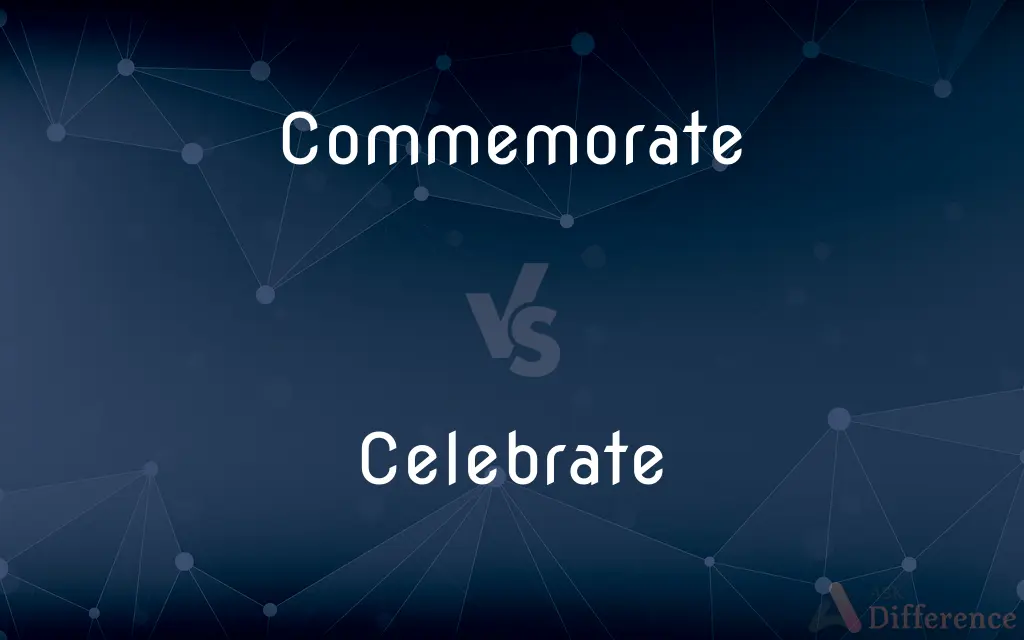Commemorate vs. Celebrate — What's the Difference?
Edited by Tayyaba Rehman — By Maham Liaqat — Updated on March 30, 2024
Commemorate is to honor a memory or event with respect, often solemnly, while celebrate involves joyfully acknowledging an occasion or achievement.

Difference Between Commemorate and Celebrate
Table of Contents
ADVERTISEMENT
Key Differences
Commemorating an event or person typically involves activities that honor and remember the significance of past occurrences, focusing on reflection and respect. These activities may include ceremonies, dedications, or educational events aimed at preserving the memory of historical events or individuals. On the other hand, celebrating an event or achievement usually entails joyful activities that express happiness and appreciation for a current or past success, including parties, festivals, or gatherings that emphasize enjoyment and festivity.
While commemoration often adopts a more solemn or reflective tone to show reverence for those being remembered or the gravity of historical events, celebration is characterized by its lively and festive nature, highlighting positive emotions and achievements. For instance, a nation might commemorate the sacrifices of soldiers in war with memorial services and moments of silence, whereas achievements such as independence are celebrated with fireworks, parades, and expressions of national pride.
The purpose of commemoration is to ensure that significant historical events, tragedies, or influential figures are respectfully remembered and their legacies preserved for future generations. In contrast, the purpose of celebration is to create moments of joy and unity, often around personal milestones like birthdays, or communal ones like national holidays, thereby reinforcing social bonds and shared identities.
Activities involved in commemoration might include laying wreaths, educational programs, or the unveiling of monuments, all aimed at reflection and remembrance. Celebratory activities, however, typically involve music, dance, communal meals, or other forms of entertainment that foster a sense of community and shared happiness.
Despite their differences, both commemoration and celebration serve important cultural and social functions. Commemoration allows individuals and societies to reflect on their history and the lessons learned from it, fostering a sense of continuity and identity. Celebration, on the other hand, emphasizes the positive aspects of human achievements and milestones, encouraging a sense of community and shared joy.
ADVERTISEMENT
Comparison Chart
Tone
Reflective, often solemn
Joyful, festive
Purpose
To honor and remember the significance of past events
To acknowledge and enjoy achievements or occasions
Activities
Ceremonies, dedications, educational events
Parties, festivals, gatherings
Focus
Historical events, tragedies, influential figures
Personal milestones, communal achievements
Emotional Response
Reflection, respect
Happiness, enjoyment
Compare with Definitions
Commemorate
To honor and remember formally.
They gathered to commemorate the centennial of the city’s founding.
Celebrate
To joyfully acknowledge an occasion.
The town celebrated its annual festival with great enthusiasm.
Commemorate
Involves reflection on past events.
The museum exhibit was created to commemorate the civil rights movement.
Celebrate
Involves festive activities.
They celebrated their wedding anniversary with a big party.
Commemorate
Focuses on legacy and remembrance.
The plaque was installed to commemorate the contributions of the philanthropist.
Celebrate
Reflects positive emotions and achievements.
The team celebrated their victory with a parade through the city.
Commemorate
May be marked by ceremonies.
A wreath-laying ceremony was held to commemorate fallen soldiers.
Celebrate
Emphasizes enjoyment and festivity.
Fireworks are traditionally used to celebrate New Year’s Eve.
Commemorate
Often associated with historical significance.
The documentary served to commemorate the impacts of the war.
Celebrate
Can mark personal or communal milestones.
The community celebrated the opening of the new park with a picnic.
Commemorate
Recall and show respect for (someone or something)
A stone commemorating a boy who died at sea
A wreath-laying ceremony to commemorate the war dead
Celebrate
To observe (a day or event) with ceremonies of respect, festivity, or rejoicing.
Commemorate
To honor the memory of (a person or event, for example), especially with a ceremony.
Celebrate
To perform (a religious ceremony)
Celebrate Mass.
Commemorate
To serve as a memorial to
The statue commemorates the discovery of anesthesia.
Celebrate
To extol or praise
A sonnet that celebrates love.
Commemorate
(transitive) To honour the memory of someone or something with a ceremony or object.
On November 11th we commemorate the fallen with a march.
Celebrate
To make widely known; display
"a determination on the author's part to celebrate ... the offenses of another" (William H. Pritchard).
Commemorate
(transitive) To serve as a memorial to someone or something.
The cenotaph commemorates the fallen.
Celebrate
To observe an occasion with appropriate ceremony or festivity.
Commemorate
To call to remembrance by a special act or observance; to celebrate with honor and solemnity; to honor, as a person or event, by some act of respect or affection, intended to preserve the remembrance of the person or event; as, to commemorate the sufferings and dying love of our Savior by the sacrament of the Lord's Supper; to commemorate the Declaration of Independence by the observance of the Fourth of July.
We are called upon to commemorate a revolution.
Celebrate
To perform a religious ceremony.
Commemorate
Call to remembrance; keep alive the memory of someone or something, as in a ceremony;
We remembered the 50th anniversary of the liberation of Auschwitz
Remember the dead of the First World War
Celebrate
To engage in festivities
Went out and celebrated after the victory.
Commemorate
Be or provide a memorial to a person or an event;
This sculpture commemorates the victims of the concentration camps
We memorialized the Dead
Celebrate
(transitive) To extol or honour in a solemn manner.
To celebrate the name of the Most High
Celebrate
(transitive) To honour by rites, by ceremonies of joy and respect, or by refraining from ordinary business; to observe duly.
To celebrate a birthday
Celebrate
(intransitive) To engage in joyful activity in appreciation of an event.
I was promoted today at work—let’s celebrate!
Celebrate
(transitive) To perform or participate in, as a sacrament or solemn rite; to perform with appropriate rites.
To celebrate a marriage
Celebrate
To extol or honor in a solemn manner; as, to celebrate the name of the Most High.
Celebrate
To honor by solemn rites, by ceremonies of joy and respect, or by refraining from ordinary business; to observe duly; to keep; as, to celebrate a birthday.
From even unto even shall ye celebrate your Sabbath.
Celebrate
To perform or participate in, as a sacrament or solemn rite; to solemnize; to perform with appropriate rites; as, to celebrate a marriage.
We are called upon to commemorate a revolution as surprising in its manner as happy in its consequences.
Earth, water, air, and fire, with feeling glee,Exult to celebrate thy festival.
Celebrate
Celebrate, as of holidays or rites;
Keep the commandments
Celebrate Christmas
Observe Yom Kippur
Celebrate
Have a celebration;
They were feting the patriarch of the family
After the exam, the students were celebrating
Celebrate
Assign great social importance to;
The film director was celebrated all over Hollywood
The tenor was lionized in Vienna
Common Curiosities
Can an event be both commemorated and celebrated?
Yes, an event can be both commemorated and celebrated, depending on its nature and the emotions it invokes. For instance, a national independence day might be commemorated by remembering the sacrifices made for freedom, while also celebrating the joy of independence.
Is commemoration always solemn?
While commemoration often has a solemn tone, it can also include elements of celebration, especially when honoring positive legacies or achievements.
Are celebrations only for positive events?
Celebrations typically focus on positive events, achievements, or milestones, emphasizing joy and festivity.
How do communities decide what to commemorate or celebrate?
Communities decide what to commemorate or celebrate based on historical significance, cultural values, and the impact of events or individuals on their collective identity or well-being.
Is there a universal way to celebrate or commemorate?
No, there is no universal way to celebrate or commemorate, as practices are deeply rooted in cultural, historical, and personal contexts.
Why is it important to commemorate historical events?
Commemorating historical events is important for remembering the past, honoring sacrifices, and learning lessons that can inform future decisions and actions.
Can personal achievements be commemorated?
Personal achievements are more commonly celebrated, but significant milestones can also be commemorated, especially if they have lasting impact or significance.
How can one participate in a commemoration or celebration respectfully?
Participating respectfully involves understanding the significance of the event, following cultural norms and traditions, and engaging in activities in a manner that honors the occasion or memory.
How do cultures differ in their ways of commemorating or celebrating?
Cultural differences in commemorating or celebrating can vary widely, with each culture having unique traditions, ceremonies, and ways of marking events that reflect their values, history, and societal norms.
Can a birthday be commemorated?
Birthdays are typically celebrated, but significant milestone birthdays, like a centennial, may be commemorated for their historical or personal significance.
Share Your Discovery

Previous Comparison
Support vs. Supporting
Next Comparison
Tankard vs. MugAuthor Spotlight
Written by
Maham LiaqatEdited by
Tayyaba RehmanTayyaba Rehman is a distinguished writer, currently serving as a primary contributor to askdifference.com. As a researcher in semantics and etymology, Tayyaba's passion for the complexity of languages and their distinctions has found a perfect home on the platform. Tayyaba delves into the intricacies of language, distinguishing between commonly confused words and phrases, thereby providing clarity for readers worldwide.














































